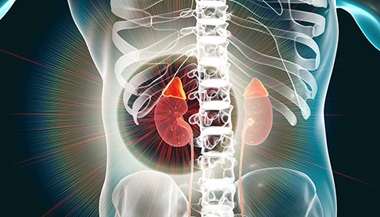Adrenal Disease During Pregnancy
Featured Experts:
Pregnancy brings about many changes in the body, including changes affecting your adrenal glands, which are located on top of your kidneys. Diseases of the adrenal glands, rare during pregnancy, can cause high blood pressure and other pregnancy complications that can endanger the health of both mother and fetus.
Johns Hopkins experts Amir Hamrahian, M.D., medical director of the Comprehensive Adrenal Center, and Lilah Morris-Wiseman, M.D., chief of endocrine surgery, provide information about adrenal issues during pregnancy and what people who are pregnant should look for.
What You Need to Know
- Hormone imbalances due to problems with adrenal glands are rare during pregnancy, but when they happen, they can place the mother’s and unborn baby’s health at risk.
- Adrenal hormone imbalances during pregnancy can result in complications such as high blood pressure, restricted intrauterine growth, preterm birth and pregnancy loss.
- If you are pregnant and diagnosed with adrenal disease that doesn’t get better on its own, medication or surgery may be needed.
What is adrenal disease during pregnancy?
Adrenal disease can create imbalances in hormones that help regulate essential functions such as metabolism, the immune system and blood pressure. Too much or too little of certain hormones can put people who are pregnant at risk for high blood pressure and other complications that can affect them and their unborn babies.
Types of Adrenal Disease During Pregnancy
Endocrine Hypertension (High Blood Pressure) During Pregnancy
About 8% of all people who are pregnant have high blood pressure (hypertension) during their pregnancy. The most common hypertensive disorders during pregnancy are gestational hypertension, chronic hypertension (with or without preeclampsia) and preeclampsia.
However, in less than 1% of pregnancies, hypertension can be caused by a hormonal problem. A condition affecting the adrenal glands can result in:
- Primary hyperaldosteronism
- Pheochromocytoma
- Cushing syndrome
Working with Your Health Care Practitioner to Manage Hypertension
During pregnancy, your health care practitioner will measure and note changes in your body weight and blood pressure during every visit. If you show signs of high blood pressure, the practitioner may recommend more blood and urine tests, and prescribe medications if necessary. While some anti-hypertensive drugs should be avoided during pregnancy, others are safe to use.
If you are pregnant and dealing with high blood pressure due to any cause, consulting with your doctor before the baby is born is important. He or she can advise you on breast-feeding (which is encouraged), and changing or discontinuing your blood pressure medications after delivery.
Primary Aldosteronism and Pregnancy
Primary aldosteronism occurs when the adrenal glands produce too much of the hormone aldosterone, which mainly regulates sodium and potassium in your blood. Too much of it can lead to losing potassium and retaining sodium. Sodium retention can cause your body to hold too much water, which increases blood pressure.
Primary aldosteronism during pregnancy may be associated with some pregnancy-related complications such as:
- Preterm birth (when a baby is born too early, before 37 weeks of pregnancy)
- Intrauterine growth restriction (when a baby does not grow as expected in the womb)
- Placental abruption (a complication of pregnancy that happens when the placenta detaches from the uterus before the baby is born)
What causes primary aldosteronism?
The most frequent causes of primary aldosteronism are:
- Overactivity in both adrenal glands for an unknown reason (idiopathic hyperplasia)
- A small, benign (noncancerous) aldosterone-producing tumor (an adenoma or aldosteronoma) in one adrenal gland that causes it to overproduce hormone
Signs and Symptoms of Primary Aldosteronism
Hypertension is the main problem associated with primary aldosteronism. Your doctor may suspect it if you cannot get your blood pressure down to normal even when taking medicine as directed.
Sometimes, but not always, primary aldosteronism causes low potassium levels. Symptoms of low potassium include:
- Muscle cramps
- Muscle weakness
- Fatigue
Diagnosing Primary Aldosteronism
In pregnancy, primary aldosteronism is rare and a diagnosis might be difficult due to physiological changes during pregnancy. If your health care practitioner suspects you have it, you will likely have a test to measure aldosterone and renin levels in your blood. Renin is a substance released by your kidneys that helps control blood pressure.
Your doctor may recommend other tests to confirm the diagnosis of primarily aldosteronism and to pinpoint what is causing it.
Primary Aldosteronism Treatment
Management of primary aldosteronism depends on the cause.
If both adrenal glands are overactive, medical treatment is recommended. There are medications used to address primary aldosteronism that are considered safe during pregnancy.
If a small, benign tumor is causing the problem, minimally invasive surgery (laparoscopic adrenalectomy) can bring primary aldosteronism under control. Although this procedure is best done before a person becomes pregnant, it can be performed safely during pregnancy in many cases.
For some people who are pregnant whose high blood pressure is due to aldosteronism, rising progesterone levels can block aldosterone action and improve the high blood pressure naturally. In this case, the doctor may be able to wait until after delivery to treat the aldosteronism.
Cushing Syndrome During Pregnancy
Cushing syndrome is a hormonal disorder caused by high levels of the hormone cortisol over a long time. Cushing syndrome during pregnancy is extremely rare because high cortisol levels can reduce fertility.
In about half of the Cushing syndrome cases that do occur during pregnancy, the cause is an adrenal tumor that causes the adrenal glands to make excess cortisol.
The condition can lead to symptoms that may be mistaken for those of pregnancy, so consulting with a doctor is important. Cushing syndrome during pregnancy can adversely affect the health of the baby and the mother, with common complications such as:
- High blood pressure
- Gestational diabetes
- Preterm birth
- Intrauterine growth restriction
- Pregnancy loss before 20 weeks
Diagnosing Cushing Syndrome in Pregnancy
Experts strongly recommend that people who have been diagnosed with Cushing syndrome consult with a doctor to get the condition under control before planning pregnancy. But if you are already pregnant when diagnosed, you should know that a range of treatments is available to lessen the risk to you and your baby.
It is very important for patients with Cushing syndrome to be evaluated at centers with experience managing the condition.
Diagnosis of Cushing syndrome during pregnancy is more difficult due to changes in hormone levels. A urine test can identify a high level of cortisol, but more laboratory and imaging studies are needed to confirm the cause of high cortisol.
Cushing Syndrome and Pregnancy — Treatment
Treatment for Cushing syndrome depends on what is causing it, how far along the pregnancy is and how severe the symptoms are. Adrenal surgeries are usually preferred during the second trimester (the middle section of pregnancy). If surgery is not the best option for you, your health care practitioner might recommend other medical treatment.
Adrenal Insufficiency and Pregnancy
Adrenal insufficiency (including Addison’s disease) happens when the adrenal glands cannot produce enough hormones, especially cortisol. The cause can originate in the adrenal gland or another gland, such as the pituitary gland or the hypothalamus in the brain.
The signs and symptoms of untreated adrenal insufficiency may appear suddenly in what is called adrenal crisis, which can be associated with stress to the body such as an injury, illness, infection or surgical procedure. It is also seen in patients who are abruptly taken off of steroid treatment.
This is a serious, potentially life-threatening problem that can place both mother and fetus at risk. Main symptoms are:
- Severe weakness
- Low blood pressure
- Low blood glucose
- Vomiting and diarrhea
- Confusion
- Shock
- Coma
Diagnosing Adrenal Insufficiency During Pregnancy
Diagnosis of adrenal insufficiency during pregnancy may be missed because of overlapping nausea, vomiting, fatigue and decreased appetite that can occur in normal pregnancy. Tests may not distinguish mild adrenal insufficiency from normal hormonal changes during pregnancy.
Most people who are pregnant, diagnosed with adrenal insufficiency and treated appropriately, are not at higher risk for maternal complications. It is important to follow your doctor’s instructions regarding medications, what to do if you get sick or injured and how to inject rescue medication.
Pheochromocytoma and Pregnancy
Pheochromocytoma is a rare tumor of the adrenal gland’s medulla. It can cause production of too much epinephrine and norepinephrine, which are hormones that help regulate blood pressure and heart rate.
During pregnancy, an overproduction of epinephrine and norepinephrine due to a pheochromocytoma can risk the health of both mother and unborn baby, particularly if not diagnosed until delivery is imminent.
Pheochromocytoma Symptoms
The most common sign of pheochromocytoma is high blood pressure. However, pheochromocytoma is a rare cause of hypertension. The blood pressure levels in patients with pheochromocytoma can always be high or they can move up and down. Sometimes the tumor can cause high blood pressure that can be life threatening.
Symptoms may vary, but may include:
- Very fast pulse
- Feeling that your heart is beating fast or fluttering (palpitations)
- Pounding heartbeat
- Headache
- Nausea
- Vomiting
- Looking pale or flushed
- Clammy skin
- Shaking (tremors)
Diagnosing Pheochromocytoma During Pregnancy
Like adrenal insufficiency, pheochromocytoma during pregnancy may be missed. The condition is rare, and its signs and symptoms can mimic those of preeclampsia, a much more common pregnancy complication.
Blood and urine tests help diagnose pheochromocytoma for people who are pregnant. Doctors look for levels of metanephrines — metabolites of epinephrine and norepinephrine — in the blood and urine. Further, imaging studies such as abdominal ultrasound and MRI scans can help doctors locate the tumor.
Managing Pheochromocytoma for Patients Who Are Pregnant
The mainstay of pheochromocytoma management during pregnancy is an initial treatment with medications called alpha blockers to control the high blood pressure, followed by surgical removal of the tumor.
The optimal time of the surgery depends on several factors, but generally, the second trimester (the middle third of pregnancy) is preferred. If the pheochromocytoma diagnosis is made in the third trimester (the last third of pregnancy), the surgery is usually postponed until after delivery.
Patients with Pheochromocytoma — Giving Birth
The preferred mode of delivery for people who are pregnant and have pheochromocytoma is cesarean section. However, vaginal delivery may be performed safely for some patients.
should be coordinated with a multidisciplinary team including anesthesiologists skilled in managing blood pressure and heart rate changes associated with pheochromocytoma.
Roshan Dinparastisaleh, a 2022 endocrinology research fellow, prepared this article under the supervision of Amir Hamrahian and Lilah Morris-Wiseman.








